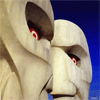Interesting article here.Which one’s Pink, they used to ask. Sadly, it took the early death of their keyboard player and co-founder to make people ask: which one’s Rick?
Richard Wright, who died on Monday at 65, was the mystery inside the enigma of Pink Floyd. If his profile had been any lower, he could have been reported missing. He was the unostentatious exception to the rule of rock stardom, rarely recognised beyond the obsessive fan base of a group so huge that they have sold three million albums in the UK this decade, without even making a new album for 14 years. He liked that anonymity just fine.
Like Charlie Watts with the Stones, Rick Wright just turned up when he was asked to and played brilliantly. To paraphrase Watts, one year’s playing and 39 years’ hanging about. Yet the outpouring of appreciation for him this week has been intense. One message board contributor said: “I’ve never met you, but you’ve been a huge part of my life for 40 years.”
Wright himself was baffled. “God, I don’t understand the whole cult of Floyd,” he told me. “I think all you writers need to talk about that. I know we’ve made some great songs and great music, but I can’t tell you why we’re so popular.”
Guy Pratt, who in 1987 inherited Roger Waters’s bass part on stage after his toxic departure from Floyd, says: “It took a while to get to know him, but he did get very close to people, especially around the band.” Pratt would later marry Gala, Wright’s daughter from the first of three marriages (to Juliette Gale, whom he wed in 1964) before the group was formed.
“He was a very quiet man, he was happiest on his boat. That was the nicest place to see him, because he was in charge there. Some bands spawn real families around them and some don’t, and Floyd did. For me, that turned into something else. It’s strange to think that I knew my father-in-law before I knew my wife.”
In the summer of 2007 I went to Wright’s modest mews house in Kensington, at the time of the 40th anniversary of Floyd’s first album, Piper at the Gates of Dawn, for what turned out to be Wright’s last interview. A slight figure, he had been grey for years so seemed not to have aged much beyond a few more lines on his face. As I arrived he was playing the album to himself, as if even he couldn’t quite believe that those were his keyboards bringing a jazz sensibility to Britain’s most avant-garde new scenesters of the day.
“Very interesting to listen to it,” he mused in his quiet, absent-mindedly mischievous way. “Now I know why it had an influence on so many bands. I can hear punk stuff going on in there.”
Wright may have seemed wary of the interview environment at first, but, having committed to it, clearly wanted it to be as natural as possible. When his publicist, keen to monitor the conversation for inadvertent controversies, said she would sit out of the way in his kitchen, he said “Yes, but I’ll still be able to see you,” and sent her out of the house altogether.
When Wright blew the dust off his memories of the pre-Floyd years, his future role began to make perfect sense. “I’m trying to think how it all started,” he said, as if the question had never been asked before. “Roger had his guitar and wanted to become a musician, Nick Mason wanted to be an architect but had played drums with various groups.”
As a child, he played trumpet, trombone and then guitar as well as piano. “When I left school, my careers master said: ‘What do you want to do?’ I said: ‘I have no idea, but I want to play music,’ and he said: ‘Well, you’re pretty good at drawing, go to architecture school.’ So I went, but I wasn’t interested in architecture at all. I was into forming shapes, but I wanted to be a musician.
“So when I was at polytechnic, I went off and had private lessons in composition at the Eric Gilder School of Music, then I went to the London School of Music; all this while I was studying architecture.
“The tutor came up to me and said: ‘You’re not into architecture, are you?’ I said: ‘No.’ He said: ‘It’s a waste of time you coming; go off and be a musician.’ But thank God I went there, because that’s where I met Roger and Nick.”
Pratt says: “His playing was very structural, maybe because they were architecture students. When he was on my bedroom wall in that 1970s age of jazz-fusion and pointless virtuosity, his subtle injection of a few chords made you see the relevance of jazz to one’s own musical world. He was responsible for me and millions of people investigating Miles Davis.”
More than that, he smuggled Davis into the group. “There was a Making of Dark Side of the Moon documentary,” Pratt goes on, “and he came up with one little gem on there, that the chords for Breathe came from Kind of Blue. Then you listened again and thought, ‘It’s true’.”
Wright said at the time: “I don’t want to be the fastest pianist on the planet, I don’t want to be Dizzy Gillespie, who could play a zillion notes a bar, I’d like to be Miles, who can play one note a bar.”
Wright was as quick to apportion praise elsewhere as he was keen to deflect it from himself. “I don’t remember the first time I met Syd Barrett. Roger knew him from Cambridge. I do have memories of sitting down with him in Highgate working out songs and being completely awe-struck by this personality that was Syd.
“He was so vibrant. It’s hard to talk about Syd, but he was unique, he had an incredible way of looking at things. One day he wrote a song in ten minutes. Me, an aspiring songwriter, I couldn’t believe it.” He took Barrett’s self-destruction and inevitable firing from the band particularly badly. “I think he was being spiked, quite honestly, with too much acid. Syd was obviously losing it, yet we all loved him dearly, and had so much respect for what he’d done.
“That’s why David [Gilmour] came into the band, the idea being we’d have a second guitarist and then do a Beach Boys thing and Syd could stay at home [like Brian Wilson] and write songs, and we’d go out and play them. Didn’t work, unfortunately. Very, very sad.
“But I remember when David Bowie came and guested when I was playing with David. He was a huge fan, and said when he heard Syd, he realised it was OK to sing in an English accent. Damon Albarn said the same thing.”
Wright kept his counsel about the infamous power struggle within Floyd, in which Waters edged him out of the group, only for Gilmour to reinstate him in the post-Roger years. Their reunion at Live 8 was a means to a charitable end: enjoyable, but unrepeatable.
“It was wonderful that we did it, because of all the arguments and issues that Roger’s had with me, and with David. But we did learn something. It would be very hard for the four of us to go together and do a world tour, simply because our ideas are so different musically.”
But he clearly loved playing on the guitarist’s later solo albums and tours, and it was mutual, as shown on the Live in Gdansk album and DVD, out next week and featuring them together on a roof-raising 25-minute version of Echoes.
“Musical telepathy,” Gilmour called it. “I’ve never played with anyone quite like him,” he said. “In my view all the greatest Pink Floyd moments are the ones where he’s in full flow. Without Us and Them and The Great Gig in the Sky, both of which he wrote, what would Dark Side of the Moon have been? And without his quiet touch, Wish You Were Here wouldn’t quite have worked. It’s a mark of his modesty that those standing ovations on my tour in 2006 came as a huge surprise to him, though not to the rest of us.”
Pratt recalls: “David would pretend to forget to introduce him, and then when he did the crowd would go bananas. It had us on the verge of tears every night.”
Having dabbled in two solo albums, in 1978 and 1994, Wright was pottering with new songs when we spoke, developing an instrumental album on the piano. When his cancer was diagnosed in December, he spent more time on his boat, trying to get well.
He’d also given up some time to one of the writing sessions organsed by Chris Difford of Squeeze at Huntsham Hall in Devon. The English singer-songwriter Helen Boulding met him there.
“Rick came down with Guy Pratt and being a Pink Floyd fan I was so excited to meet him,” she says. “As it turned out, I was put with Rick and Chris on the first day to write, which was very exciting and very daunting, but it was one of the most relaxed writing experiences I’ve ever had. Rick was the most gentle, humble, down-to-earth guy. I couldn’t believe that someone so talented and so successful was so low-key and gracious.”
If Wright ever was recognised, it was for the right reasons. “I really appreciate that I can walk around the streets of London or anywhere and people come up and say 'Thank you for your music.' Not 'Can I have your autograph?’ It's really nice,” he told me. “I don’t want to prove anything, I don't need to go out and advertise myself. I don’t have the ego to do that.”
As we shook hands and he went about his business, his expression betrayed just a hint of relief that a rare moment under the microscope was over.
Times Interview with Richard Wright
-
apocalypse

- Knife

- Posts: 483
- Joined: Wed Dec 01, 2004 11:24 am
- Gender: Male
- Location: Falling further down the rabbitt-hole
Times Interview with Richard Wright
http://entertainment.timesonline.co.uk/ ... 781413.ece
-
Syd'sSexy

- Supreme Lord!

- Posts: 5898
- Joined: Fri Feb 16, 2007 6:34 pm
- Gender: Female
- Location: Cosmopolitan Dayton, Ohio
Re: Times Interview with Richard Wright
Thanks Apocalypse. Wonderful reading. Rick was such an exceptional person.
-
Beowulf

- Judge!

- Posts: 2072
- Joined: Tue Sep 09, 2008 7:03 pm
- Gender: Male
- Location: Cheshire, England
Re: Times Interview with Richard Wright
Nice article, brings out many of the important points
-
snifferdog

- Site Admin

- Posts: 12104
- Joined: Fri Jun 16, 2006 7:17 pm
- Gender: Female
- Location: Green Hill Zone
Re: Times Interview with Richard Wright
Nice article - thanks for posting. I think it suited Rick to be the "other one" that nobody noticed in Pink Floyd.
-
Beowulf

- Judge!

- Posts: 2072
- Joined: Tue Sep 09, 2008 7:03 pm
- Gender: Male
- Location: Cheshire, England
Re: Times Interview with Richard Wright
Nobody except those who really listened ...snifferdog wrote:Nice article - thanks for posting. I think it suited Rick to be the "other one" that nobody noticed in Pink Floyd.
-
snifferdog

- Site Admin

- Posts: 12104
- Joined: Fri Jun 16, 2006 7:17 pm
- Gender: Female
- Location: Green Hill Zone
Re: Times Interview with Richard Wright
More fool those who didn't really listen. At least during David's tour, he got to see how much Pink Floyd fans appreciated him.
-
oz1701

- Supreme Lord!

- Posts: 8093
- Joined: Sun Feb 11, 2007 1:27 am
- Location: Mostly Harmless
Re: Times Interview with Richard Wright
a very nice article - thanks for posting it 
-
Beowulf

- Judge!

- Posts: 2072
- Joined: Tue Sep 09, 2008 7:03 pm
- Gender: Male
- Location: Cheshire, England
Re: Times Interview with Richard Wright
Yes, Echoes at Bridgewater Hall, Manchester was a particularly outstanding moment - for me it was the main reason to 'remember that night'.snifferdog wrote:More fool those who didn't really listen. At least during David's tour, he got to see how much Pink Floyd fans appreciated him.
